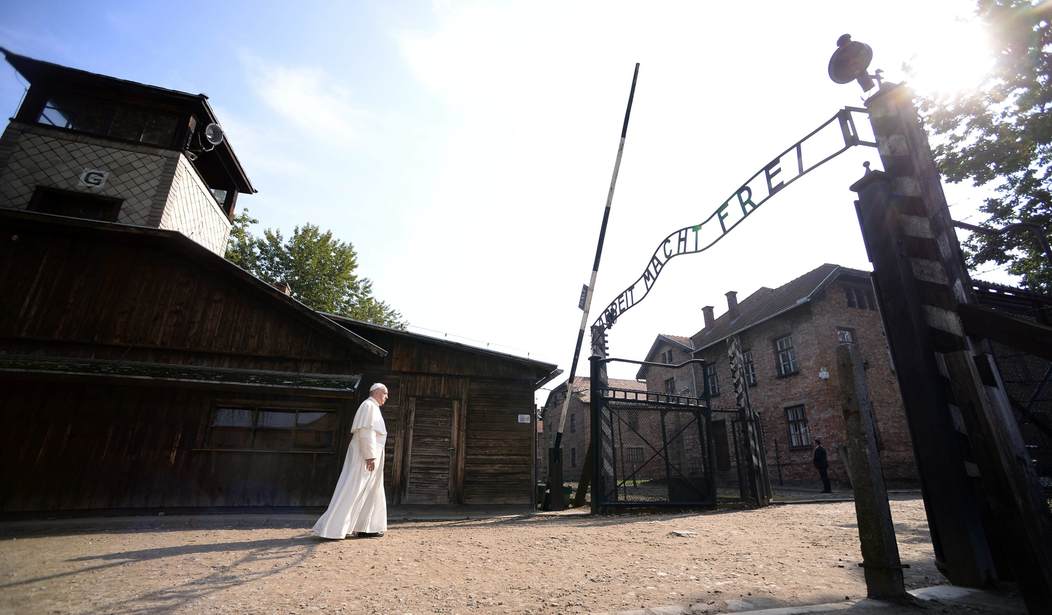A few days before visiting the hallowed site of Auschwitz on Friday, Pope Francis denied the religious motivations behind the Islamic State (ISIS), admitting that the world is at war but denying that the reasons for that war are religious.
“The world is at war because it has lost peace,” Francis said, responding to the Tuesday death of Rev. Jacques Hamel in France, who was killed by two attackers in the name of ISIS.
“There is a war of interest, there is a war for money, a war for natural resources, a war to dominate people,” the pope argued. “Some might think it is a war of religion. It is not. All religions want peace. Others want war.”
Francis’ stubborn refusal to accept the religious motivations of the Islamic State is not unique to him, of course. Even President George W. Bush once said, “The face of terror is not the true faith of Islam. That’s not what Islam is all about. Islam is peace. The terrorists don’t represent peace. They represent evil and war.”
The difficulty comes when you find yourself explaining Islam as a religion of peace despite the plain truth of terrorists killing in the name of Islam and in the name of a political organization dedicated to making Islam rule over all the world.
The Islamic State calls itself Islamic, encourages violence in the name of spreading Sharia (Islamic law), and murders apostates from their religion. Only those who deny any connection between religion and violence at the outset can stubbornly hold to the idea that ISIS is not Islamic.
This is emphatically not to say that the Islamic State’s interpretation of their faith is the only correct one. Islam has hundreds of different interpretations — similar to the denominations in Christianity.
It is not the place of non-Muslims to say which Islam is the true one. We can note that early Muslims dominated the Middle East and North Africa in wars of conquest, spurred on by the desire to spread their faith. We can also note the efforts of many Muslims who emphatically embrace American liberty and have given their lives in its service.
Francis’ declarations that this world war is inspired by material and economic concerns trace back to Karl Marx, who insisted that ideological explanations for war are only surface level. He claimed that war only made sense as a struggle for resources, but it is exactly wars like this one that prove his explanation so weak.
When people are willing to commit suicide to kill others, as in the case of September 11, 2001 — or even the Japanese kamikaze pilots in World War II — their motivations cannot be pushed off as material. Especially those who lack families back home have no inspiration but their belief in something greater than themselves.
Students of World War II are rightly horrified by the Holocaust, and Pope Francis was right to go to Auschwitz and remember the unspeakable evil and suffering of that place. Yet that very place is the ultimate rebuke to Francis’ explanation of warfare.
How the Holocaust itself proves Pope Francis’ explanation to be inadequate.
The merciless and ideological extermination of entire peoples which Adolf Hitler insisted upon, even as his own empire was crumbling, shows the power of ideas to motivate behavior. In these Polish death camps, the Nazis aborted the very manpower which could have given them the atomic bomb.
It was also here that Christians and Jews found renewed purpose. Viktor Frankl penned a classic work on the triumph of meaning over matter. Maximilian Kolbe gave his life for another. Dietrich Bonhoeffer fought for the soul of Germany, and was willing to sacrifice even his pacifist conscience to end the evil which had overtaken his homeland.
Meaning, purpose, ultimate reality. These are the things that drive human behavior, and while material needs and concerns are an important part of our world, they cannot explain such unspeakable evil or such inspiring virtue.
If we learn nothing else from the Holocaust, let us learn that fundamental truth of Man’s Search for Meaning: that a purpose to live for is much more important than the bread on our table, or the strength of our bodies. For good or ill, beliefs about ultimate reality — be they religious or “secular” — are the driving force behind peace or war, and must be acknowledged.









Join the conversation as a VIP Member